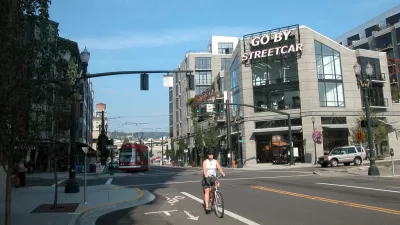Portland's over-educated, under-employed population is largely a semi-retired community of young adults, according to some. But with rising housing prices and overall cost of living, it is unclear how Portland will retain these characteristics.
As Claire Cain Miller writes for a recent piece in the New York Times Magazine, Portland's future as an urban utopia for kombucha brewers, kale growers, and households living off barista tips is hazy. The city has a high amount of educated residents, and unlike corporate nearby cities like San Francisco or Seattle, Portland offers few high-level employment opportunities for them, leading many young people to enter semi-retirement.
According to a July report by the Oregon Employment Department, the state is concerned with low personal income levels, coupled with its employment-to-population ratio. As Miller highlights, "the average income of Oregonians in recent years 'may have been a 'victim' of the state’s attractiveness, and a resulting population influx' by new residents who don’t earn much, the report said."
Indeed, Aaron Renn, urban-affairs analyst who writes for the Urbanophile blog, shared that "personal income per capita in [Portland] grew by a mere 31 percent between 2000 and 2012, slower than 42 other cities, including Grand Rapids, Mich., and Rochester." Despite these low metrics, the population of Portland keeps growing, with new residents attracted to its quality of life. Indeed, "David Albouy, an economics professor at the University of Illinois, has created a metric, the sacrifice measure, which essentially charts how poor a person is willing to be in order to live in a particular city. Portland, he discovered, is near the top of the list." People are moving to Portland not to kickstart their careers, but rather to enjoy the city's unique nature.
With concerns over rising housing prices, many of Portland's semi-retired youth may soon be priced out and forced to move to cheaper pastures.
FULL STORY: Will Portland Always Be a Retirement Community for the Young?

Planetizen Federal Action Tracker
A weekly monitor of how Trump’s orders and actions are impacting planners and planning in America.

Maui's Vacation Rental Debate Turns Ugly
Verbal attacks, misinformation campaigns and fistfights plague a high-stakes debate to convert thousands of vacation rentals into long-term housing.

San Francisco Suspends Traffic Calming Amidst Record Deaths
Citing “a challenging fiscal landscape,” the city will cease the program on the heels of 42 traffic deaths, including 24 pedestrians.

Amtrak Rolls Out New Orleans to Alabama “Mardi Gras” Train
The new service will operate morning and evening departures between Mobile and New Orleans.

The Subversive Car-Free Guide to Trump's Great American Road Trip
Car-free ways to access Chicagoland’s best tourist attractions.

San Antonio and Austin are Fusing Into one Massive Megaregion
The region spanning the two central Texas cities is growing fast, posing challenges for local infrastructure and water supplies.
Urban Design for Planners 1: Software Tools
This six-course series explores essential urban design concepts using open source software and equips planners with the tools they need to participate fully in the urban design process.
Planning for Universal Design
Learn the tools for implementing Universal Design in planning regulations.
Heyer Gruel & Associates PA
JM Goldson LLC
Custer County Colorado
City of Camden Redevelopment Agency
City of Astoria
Transportation Research & Education Center (TREC) at Portland State University
Jefferson Parish Government
Camden Redevelopment Agency
City of Claremont





























